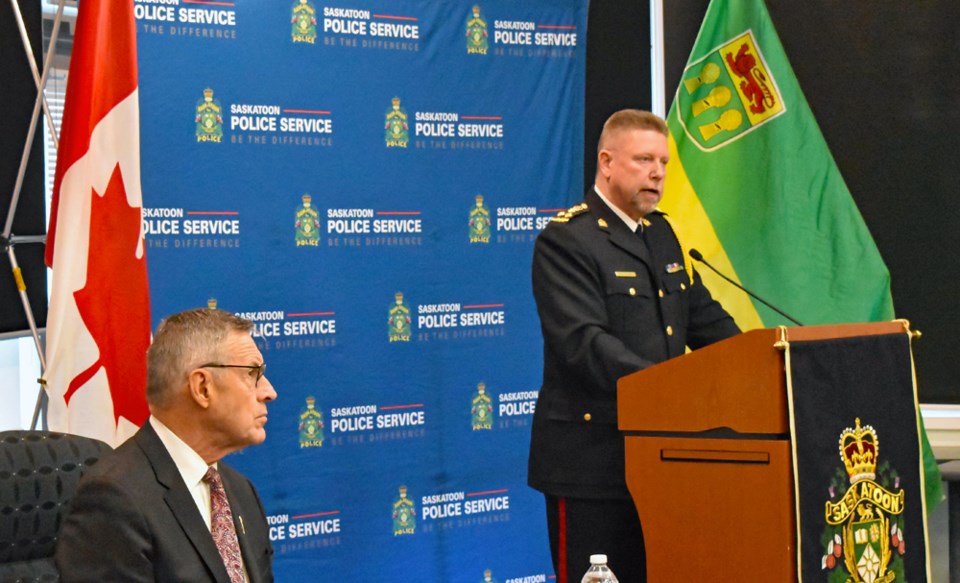SASKATOON — The Saskatoon Police Service is looking to use the $7.38 million in total funding grants that it received from the provincial government to strengthen its mental health crisis initiatives in communities.
The grant is part of the 2022-2023 Municipal Police Grants Program by the Ministry of Corrections, Policing and Public Safety, where $6.48M is provided to the city’s police service while $900,000 is from the Saskatchewan Government Insurance.
SPS Chief Troy Cooper said the fund would support their policing initiatives like the Police and Crisis Team, which respond to community incidents that involve persons experiencing a mental health crisis.
Cooper said that in almost two years, especially during the COVID-19 pandemic, their police officers and mental health workers have responded to roughly 40 per cent of calls and complaints involving persons in mental distress or the issue has a mental component.
“In addition to those calls, we handle mental health act warrants. We assist some in the medical community in managing people within the community that has mental health challenges. What we’ve seen in over a year is that need has grown by seven per cent,” said Cooper.
“I think over the last year, since the effects of the pandemic and the challenges of homelessness in the community, we’ve seen an even greater increase. The types of calls we go through deal with people with outstanding mental health warrants.”
Cooper said their police officers became the backup resource when responding to or addressing cases involving people with mental health issues.
“To address those, what happened is that [SPS], as social issues start to increase, police respond to those social issues. That’s not always the most appropriate response. We have police crisis teams that respond more appropriately,” said Cooper.”
“We also have alternate response officers responding to incidents that are not criminal in nature or not violent in nature. We've also got that relationship with our mobile crisis unit here in Saskatoon where we screen calls when they come in.”
He added that screening the calls to determine if there are no threats of violence and no ongoing criminal act allows them to send their mobile crisis partners with programs to handle these types of cases instead of their police officers.
“If you [don’t] have those sorts of partnerships, the police are left with the being the only avenue of response, and we're trying to make sure that we have strong partnerships in some of those other areas,” said Cooper.
“Currently, we have an alternate response. But we'll evaluate that program to see how we can maximize it. We've got our PAC teams and as you've heard, we're continuing to lobby to expand those programs for that reason.”
Cooper said de-escalation and handling social crisis issues have also been part of their training program for police officers. The PACT is the lead unit for responding to calls that involve mental health issues.
“One of our strengths is the alternate response officer program. They receive training and enforcement but also in trauma-informed methods of handling folks, specifically how to deal with homelessness and addictions,” said Cooper.
“Handling situations with people who suffered through some of those experiences, and I think they are more appropriate response because they are often in contact routinely, regularly, with some of the folks experiencing homelessness.”
Cooper added that building trust and relationships by these officers with people dealing with mental health and other social issues gives them a chance to provide and connect them to the services they need to overcome their challenges.
He said that the SPS also assists in helping people in their custody with mental issues get the needed help and treatment by relocating them to facilities that handle these cases and issues.
“Generally, people in a situation where someone would call the police, and the police would be the alternative response. This allows us to send a police officer and a crisis worker to address some of those calls,” said Cooper.
That’s why the $6.48M grant from the Ministry of Corrections is a big help for SPS as they can now hire additional 48 police service positions, especially personnel for PACT that have officers trained in handling people with mental health issues and mental health workers.
Officers with mental health issues training and mental health workers are an integrated and coordinated team that responds to individuals experiencing mental distress or a mental health crisis in the city’s communities.
“The funding this year covers two crisis workers and two police officer positions. Last year, we added a third team, but we continue to work with the [provincial] government to show the priorities that we have here and the need for additional resources in that area,” said Cooper.
“We need more [mental health workers]. It’s one of those cases where the government agrees with us that it is easily identified. It is statistically supported that it is an appropriate way to divert people from the criminal justice process and outpatient hospitals.”
Cooper said they could better serve the community if they had more personnel to assess people with mental issues and whether they are safe enough to stay in a community.



